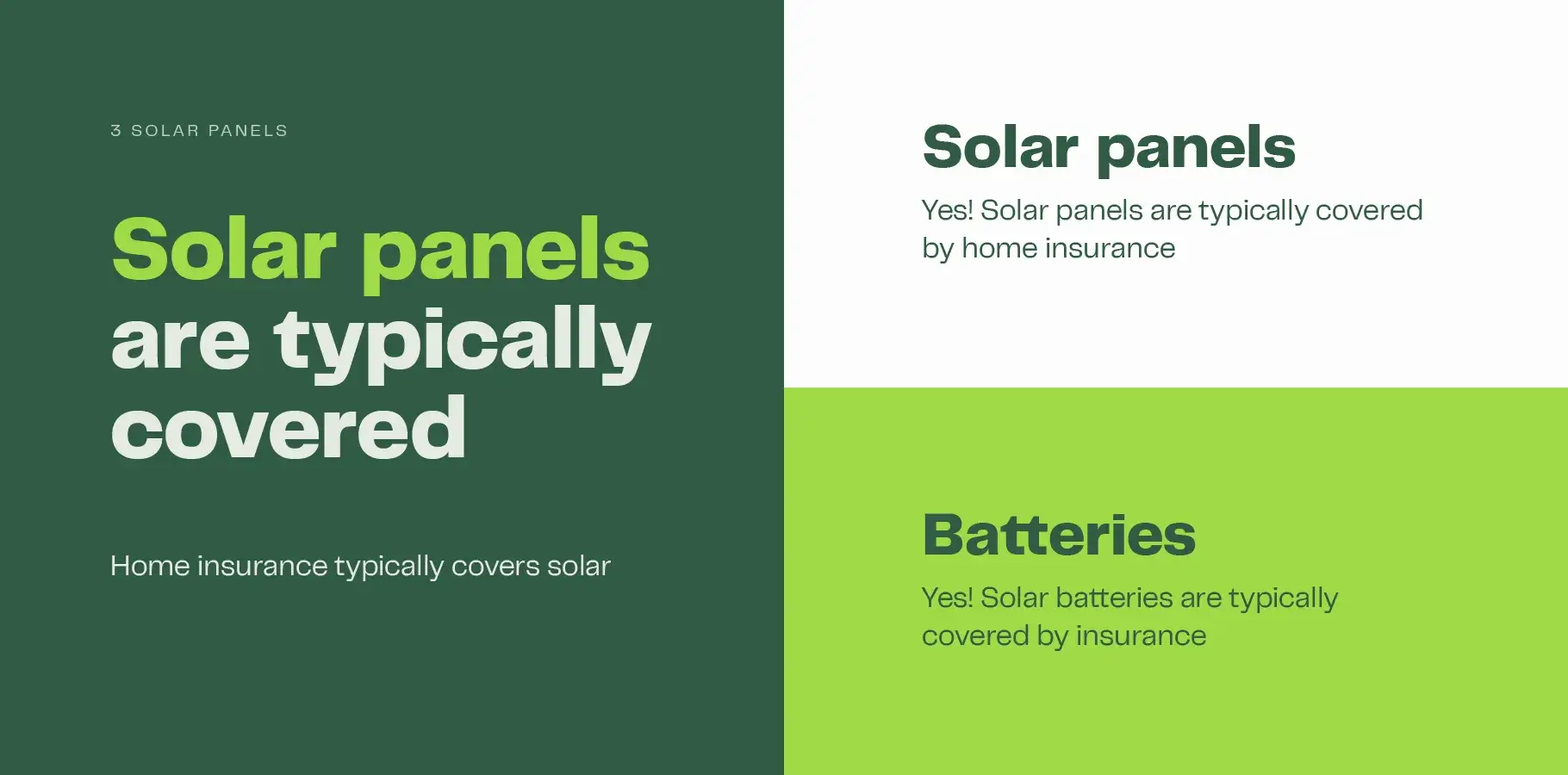Australia has one of the highest adoption rates for residential solar. With more than 4 Million solar systems installed in Australia, more than one in three Australian homes now have rooftop solar.
With an average solar cost ranging from $5,000 – $8,500 for a 6.6kW system, up to $20,000+ for a 20kW system, solar is a substantial investment. While solar panels are highly durable and well suited to Australian conditions, it’s important that your solar system is protected in the event that nature intervenes and causes damage to your system.
We explore whether solar panels are covered in your home insurance policy, whether they require separate insurance, and whether you can expect to pay more to keep your solar investment protected.
Are solar panels covered by home insurance?
Yes, most home insurance policies in Australia will include solar panels as part of the coverage. Solar panels are a permanent fixture to the property which means that just like your roof or antenna, they are considered part of the building. Solar batteries are also covered by home insurance policies.


Solar panels are covered under the building coverage portion of home insurance policies. In the event of a natural disaster like storms, fire, or hail, solar panels will typically be covered under the standard building coverage and are therefore treated the same as damage to the roof, walls, or any exterior, fixed part of the home.
Insurance companies typically view solar panels as a valuable addition to the property, not a separate item on the policy. Home insurance is calculated based on the value of the home therefore, solar panels add value to the home and are likely to increase the cost of coverage.
According to GIO; “Like other home improvements that add value to your property and bump up your sum insured, adding solar panels could affect your home insurance premium.” Budget Direct echoes the same sentiment in their online documentation: “If your solar panels are covered by your insurance, this should also be reflected in your sum insured.”
GIO and Budget Direct are just two examples of insurers that share similar policies on solar panel coverage in home insurance policies. It’s important to check with your insurer to determine your exact level of coverage.
Solar panels do not cover faulty installations
Solar panels are highly durable and it is unlikely that you will ever need to make an insurance claim for your system. However, it’s important to understand that your home insurance will likely not cover the effects of a poor installation that causes your panels to stop working.
It’s also highly unlikely that home insurance will provide protection for a DIY solar system.
We recommend sourcing quotes from reputable solar companies and buying quality components, to avoid a sub-standard install.
Panel damage covered by insurers
Types of events that can lead to claims on your solar panels include: hail damage, storm damage, falling debris and fire. While solar roof tiles in Australia are less susceptible to storm damage, they can still be impacted by falling debris.
Should you update your policy after installing solar?
Yes, you should update your existing policy as soon as you first install solar panels. We recommend contacting your provider and updating your coverage by the value of your solar system. While solar panels are typically covered in an existing policy where they are declared and accounted for in the agreed building value, it’s important for home owners installing new systems to update their insurance policy accordingly.
If you take out a home insurance policy after installing solar, then your insurance policy and premium should already include your solar panels. Conversely, if you add solar after starting your home insurance policy, it’s important to update your insurer with the value of your solar panels.


Failing to update your insurance provider
Failing to update your insurer or, not including solar panels in your policy, can mean that they will not be covered in the event of an incident.
If your solar panels are damaged or destroyed during a storm, your insurer may refuse to cover the cost of replacement because they were not included in your policy. Similarly, if your policy does not accurately reflect the value of your solar panels, then you may not be covered for the cost of replacement. Furthermore, if the solar panels are found to be the cause of an electrical fault which causes further damage, your claim may be refused.
Insurance companies have been known to refuse claims for trivial matters. Take one case in 2023 where AAMI refused to payout on a house fire caused by an electrical fault because the couple had failed to disclose the sold eggs at their farm gate.
Moral of the story? Don’t give your insurer any ammunition to refuse your claim by not disclosing your solar panels.
How do solar panels impact home insurance premiums?
Installing solar panels will likely lead to an increase in your home insurance premiums. Just like any value-addition to your property, solar panels increase the cost of replacement and therefore increase the level of coverage required.
It’s important to remember that any increase to your home insurance policy will typically be calculated as a value % of the total property.
For instance, if you have a property insurance agreement that values your building at $500,000, then adding $10,000 worth of solar would increase the value to $510,000. The latest data suggests that home insurance costs range from around $1,900 to $4,700 per year. As an example, If we assume that a policy for a $500,000 property costs $2,500 per year (0.5% of the property value) then an increase in the policy value to $510,000 would only result in a $20-$30 increase in the annual policy.
The slight increase in premiums versus the replacement cost makes the decision to inform your insurance company a no-brainer.
